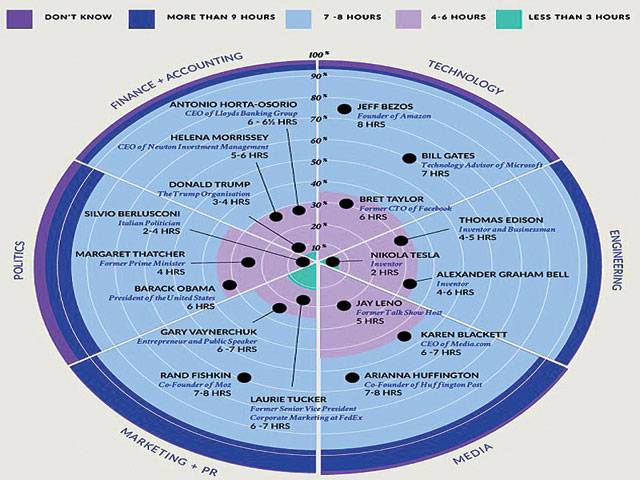Ellie Zolfagharifard
Part of Margaret Thatcher's formidable reputation was down to how little she slept.
The former British prime minister was believed to get by on just four hours of sleep each night - and she wasn't the only one.
Nikola Tesla, the 'grandfather of electricity' was thought to sleep just two hours a night, while Italian politician Silvio Berlusconi only gets two to four hours, and Barack Obama six hours.
Now, a new infographic reveals some of the strange sleeping habits of the world's most successful people, and most are below the recommended levels of shut eye.
Microsoft founder, Bill Gates, averages seven hours sleep and billionaire Donald Trump only gets three to four hours.
The National Sleep foundation recommends seven to nine hours of sleep a night for 18-64 years olds to maintain a healthy lifestyle.
Despite Thatcher and Obama's example, politicians are the group who with the most people who get more than nine hours of sleep each night.
The chart also shows how people in marketing and PR get the least sleep, with the sector having the highest number of people who sleep less than three hours.
'You often read and hear stories of successful individuals, especially in business, boasting about how much they get done while the rest of us are tucked up in bed,' said Made to Measure Blinds who made the graphic.
'We wanted to compare these individuals against data from other people working in those sectors.'
The researchers took data from a YouGov survey, which asked 1,401 working adults about their sleeping habits to create a chart.
But people don't necessarily have to get unbroken sleep to get their rest.
'Though often relying on anecdotal evidence, there have been reported cases of alternative sleeping patterns that have been used to apparent success,' the Berkshire-based company said.
The firm has also created a chart detailed various sleep patterns, such as the Uberman cycle, which was used by Leonardo Da Vinci. This involves taking 20 to 40 minutes naps every four hours.
The Dymaxion cycle, meanwhile, was created by Richard Buckminster 'Bucky' Fuller – a renowned American neo-futuristic architect who died in 1983. He slept for 30 minutes every six hours.
Former British Prime Minister, Winston Churchill, enjoyed taking siestas. He would sleep four to four and a half hours per night and then take a 90 minute nap around noon.
However, research last year found that interrupted sleep can be as physically detrimental as having no sleep at all.
The study linked interrupted sleep patterns and compromised cognitive abilities, shortened attention spans, and negative moods.
The researchers at Tel Aviv University discovered that interrupted sleep is equivalent to no more than four consecutive hours of sleep.
Sleeping well is also linked to general better health, with those who get enough sleep more likely to have better mental health and less likely to be overweight, develop high blood pressure, raised cholesterol and Type 2 diabetes.
CAN 8 HOURS OF SLEEP EACH NIGHT HELP
WARD OFF ALZHEIMER'S?
Having eight hours of 'quality sleep' a night can help stave off developing Alzheimer's in later life, a study has found.
Sound sleep in young and middle-aged people allows the brain to consolidate the day's memories- boosting memory and learning.
Now research has revealed that sleeping well in our formative years can predict better mental function in old age, and may be able to delay or even help prevent age-related memory loss.
Michael Scullin, director of Baylor University's Sleep Neuroscience and Cognition Laboratory, in Texas, examined 50 years of sleep research in his study.
'It's the difference between investing up front rather than trying to compensate later,' he explained.
'We came across studies that showed that sleeping well in middle age predicted better mental functioning 28 years later.'
Sleeping well is also linked to general better health, with those who get enough sleep more likely to have better mental health and less likely to be overweight, develop high blood pressure, raised cholesterol and Type 2 diabetes- all factors which make people more prone to memory loss.–Daily Mail
Friday, April 19, 2024
Snoozing habits of the world's most successful people

8:27 AM | April 19, 2024
8:09 AM | April 19, 2024
Formula 1 returns to China for Round 5
9:05 PM | April 19, 2024
Germany head coach Julian Nagelsmann extends contract till 2026 World Cup
9:00 PM | April 19, 2024
IMF urges Italy, France to spend less, Germany to loosen purse strings
8:57 PM | April 19, 2024
PM calls UAE president, admires Emirati leadership's response to recent Dubai rains
8:55 PM | April 19, 2024
Church leader calls for including Christians in Gandhara Corridor
8:50 PM | April 19, 2024
A Tense Neighbourhood
April 19, 2024
Dubai Underwater
April 19, 2024
X Debate Continues
April 19, 2024
Hepatitis Challenge
April 18, 2024
IMF Predictions
April 18, 2024
Kite tragedy
April 19, 2024
Discipline dilemma
April 19, 2024
Urgent plea
April 19, 2024
Justice denied
April 18, 2024
AI dilemmas unveiled
April 18, 2024
ePaper - Nawaiwaqt
Advertisement
Nawaiwaqt Group | Copyright © 2024





